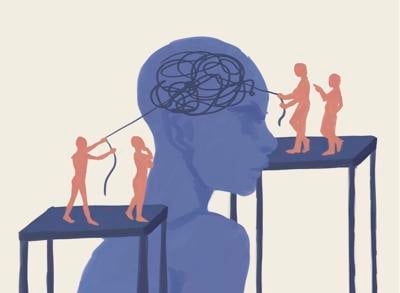Editor’s Note: This article contains reference to mental illness.
The terms “pandemic” or “epidemic” are mainly used to describe diseases that spread at a rapid pace across communities or regions, but as conversations about mental health are increasing, mental health professionals are expanding these definitions to include mental illnesses.
In light of the COVID-19 pandemic, health has surged to the forefront of public attention. Kelly Crosbie, director of the Division of Mental Health, Developmental Disabilities and Substance Use Services of the NC Department of Health and Human Services, said she hopes to bring focus to a different kind of health affected during COVID-19 — mental health.
“When the second leading cause of death for young people 11 to 24 in the nation is suicide, we have an epidemic,” Crosbie said.
Crosbie said she saw an increase in mental health and substance use issues during and after the COVID-19 pandemic, especially in students and younger people.
“The pandemic was life-changing for everybody,” Crosbie said. “We lost so much in terms of family and loved ones and two years of school life for young people. A lot of depression and anxiety symptoms in particular are caused by extreme life stressors.”
Randolph Brooks, assistant director for diversity and outreach at the Counseling Center, said 70% of college students suffer from some type of mental distress at some point, but only 15 to 20% of them take advantage of the services the Counseling Center provides.
Brooks explained that students hesitate to seek counseling due to the stigma that revolves around mental health.
“For some, talking about their problems makes it real, even though the problems have already been there,” Brooks said. “For others, it is just still taboo to talk about.”
Crosbie said it is important for young people and adults to share their experiences with others who might be or have been in a similar situation.
“One in five people have mental health issues, and it's just part of life,” Crosbie said. “The more that we talk about it, the more we embrace it and share among ourselves, the more we can help each other understand that it's treatable.”
Brooks said there is an exceeding amount of pressure on college students that is not unique to NC State. This especially affects students who are already struggling with anxiety and depression.
“There is always a way out, and the way out for you may not be the way out for me,” Brooks said. “It might be taking a semester off, dropping a class or changing majors. But a lot of our students aren’t getting that message right now. They think if they [applied for] that major, they need to start that immediately, and if they missed one class, all of a sudden they’re derailed. And that is a significant concern for our students.”
Both Brooks and Crosbie said mental illness can be viewed as an epidemic comparable to COVID-19.
“Just like COVID spreads like a wildfire, depression and anxiety will show up in a myriad of ways,” Brooks said. “One quarter of the world’s population could potentially be diagnosed with depression or anxiety, so mental illness is definitely a global issue.”
Crosbie said the epidemic has to do with a lack of acknowledgement and understanding of mental health as a serious issue and failure to provide treatment early on.
“Our treatment system can actually be quite confusing,” Crosbie said. “When you have a chronic health condition like diabetes, you know where to get treatment. But if someone is suffering from anxiety or depression, they don’t always know where to go.”
Brooks said to help address mental health, it’s important to create awareness of counseling services and implement them in the community.
“We need to make sure that this campus is aware of the concerns and needs of our students,” Brooks said. “How can we as a community best help our students? How can we essentially take the message of mental wellness from inside the four walls of the Counseling Center and out to the broader campus community?”
The Counseling Center is open Monday through Friday from 8 a.m. to 5 p.m. Brooks said students should get connected in other ways in addition to counseling.
“We also encourage our students to get involved in activities and clubs and organizations because we recognize that a lot of our students need that community, they need that connection and they need to find the space where they feel like they belong,” Brooks said.
For more information on the resources the Counseling Center offers, refer to its website.


(0) comments
Welcome to the discussion.
Log In
Keep it Clean. Please avoid obscene, vulgar, lewd, racist or sexually-oriented language.
PLEASE TURN OFF YOUR CAPS LOCK.
Don't Threaten. Threats of harming another person will not be tolerated.
Be Truthful. Don't knowingly lie about anyone or anything.
Be Nice. No racism, sexism or any sort of -ism that is degrading to another person.
Be Proactive. Use the 'Report' link on each comment to let us know of abusive posts.
Share with Us. We'd love to hear eyewitness accounts, the history behind an article.